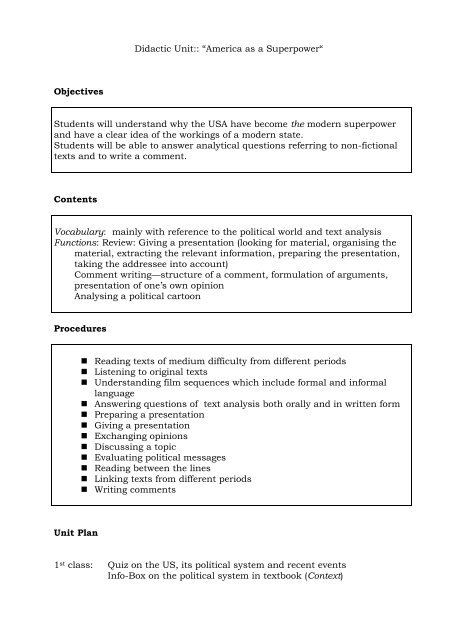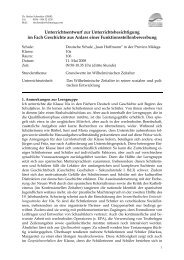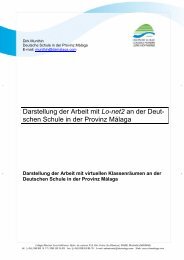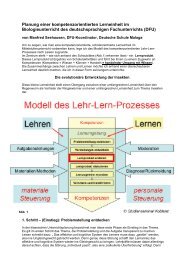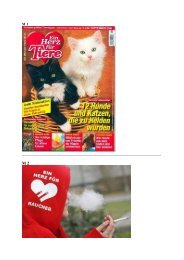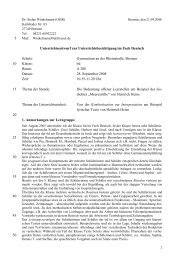America as a Superpower--Unit Plan - Praktikum macht Schule
America as a Superpower--Unit Plan - Praktikum macht Schule
America as a Superpower--Unit Plan - Praktikum macht Schule
Create successful ePaper yourself
Turn your PDF publications into a flip-book with our unique Google optimized e-Paper software.
Didactic <strong>Unit</strong>:: “<strong>America</strong> <strong>as</strong> a <strong>Superpower</strong>“<br />
Objectives<br />
Students will understand why the USA have become the modern superpower<br />
and have a clear idea of the workings of a modern state.<br />
Students will be able to answer analytical questions referring to non-fictional<br />
texts and to write a comment.<br />
Contents<br />
Vocabulary: mainly with reference to the political world and text analysis<br />
Functions: Review: Giving a presentation (looking for material, organising the<br />
material, extracting the relevant information, preparing the presentation,<br />
taking the addressee into account)<br />
Comment writing—structure of a comment, formulation of arguments,<br />
presentation of one’s own opinion<br />
Analysing a political cartoon<br />
Procedures<br />
Reading texts of medium difficulty from different periods<br />
Listening to original texts<br />
Understanding film sequences which include formal and informal<br />
language<br />
Answering questions of text analysis both orally and in written form<br />
Preparing a presentation<br />
Giving a presentation<br />
Exchanging opinions<br />
Discussing a topic<br />
Evaluating political messages<br />
Reading between the lines<br />
Linking texts from different periods<br />
Writing comments<br />
<strong>Unit</strong> <strong>Plan</strong><br />
1 st cl<strong>as</strong>s: Quiz on the US, its political system and recent events<br />
Info-Box on the political system in textbook (Context)
Evaluation: Filling in the gaps in a diagram<br />
2 nd cl<strong>as</strong>s: Text analysis: “The Superman Myth” by Charles Krauthammer<br />
about the <strong>America</strong>n president’s real and supposed power<br />
Comparison of the Spanish and German political systems with the<br />
<strong>America</strong>n one: Common features and differences<br />
3 rd cl<strong>as</strong>s: The National Rifle Association<br />
NRA Fact Sheet and the NRA’s advertisement in commemoration of<br />
the 200 th Anniversary of the Bill of Rights<br />
Differences USA-EuropeExpressing one’s opinion<br />
4 th cl<strong>as</strong>s: Group work—isolation of main <strong>as</strong>pects of a text, presentation<br />
before the cl<strong>as</strong>s (preparation of transparencies)<br />
Group 1: Mayflower Compact and Excerpt from the Declaration of<br />
Independence<br />
Group 2: Bill of Rights<br />
Group 3: Gettysburg Address<br />
5 th cl<strong>as</strong>s: Stephen Vincent Benét, Western Wagons<br />
Reading and extracting information about the settlement of the<br />
West<br />
From “going West” to present-day mobility (pictures of U-haul etc.)<br />
6 th cl<strong>as</strong>s: Texts by <strong>America</strong>n presidents (W<strong>as</strong>hington, Jefferson, Monroe, Th.<br />
Roosevelt) about <strong>America</strong>’s role in world politics—Extracting<br />
relevant information, tracing <strong>America</strong>’s changing role in world<br />
politics<br />
Pupils work in groups, prepare transparencies, present their<br />
results before the cl<strong>as</strong>s<br />
7 th cl<strong>as</strong>s: Text “The Conscience of a President” about Woodrow Wilson’s<br />
decision to <strong>as</strong>k the Congress to declare war on Germany<br />
8 th cl<strong>as</strong>s: Film sequence from Pearl Harbour (Roosevelt before Congress)<br />
Listening to Roosevelt’s “Annual Message to the Congress,”<br />
January 6, 1941—understanding the text and extracting the<br />
relevant information, reading the text for confirmation<br />
9 th cl<strong>as</strong>s: Student presentation (10 min.): Germany at the end of World War<br />
II (reference to Marshall <strong>Plan</strong>)<br />
Use of visual material: cartoons, photos etc.<br />
Listening to the Truman Doctrine, followed by reading, tracing the<br />
development of the US foreign policy<br />
10 th cl<strong>as</strong>s: Song by Sting, “Russians”—analysis of a song<br />
Cuba Crisis—analysis of cartoon “Kennedy and Krushchev wrestle”<br />
Backward reference to Short Story Snow read in 10th grade<br />
11 th cl<strong>as</strong>s: Student presentation (10 min): Vietnam up to 1954
Student presentation (10 min): The most important events of the<br />
Vietnam War<br />
Text: Lyndon B. Johnson, Peace without Conquest<br />
12 th cl<strong>as</strong>s: Cl<strong>as</strong>s in cooperation with the History teacher (languages English<br />
and German) about the end of the Cold War<br />
13 th cl<strong>as</strong>s: Text “Must <strong>America</strong> Lead?”—Discussion<br />
14 th cl<strong>as</strong>s: Student Presentation (10 min): USA vs. Iraq—What does <strong>America</strong><br />
want?<br />
Discussion<br />
Evaluation<br />
Continuous <strong>as</strong>sessment of student participation in cl<strong>as</strong>s (oral work)<br />
Written homework—comments, analyses<br />
Presentations<br />
Written exam—Comprehension and Analysis of a Text, Comment<br />
(George W. Bush, Inaugural Address [shortened version], questions<br />
referring to his view on <strong>America</strong>’s internal problems and foreign<br />
policy, t<strong>as</strong>k referring to how Bush appeals to the patriotic feelings<br />
of his countrymen, comment [choice between comment on the 2 nd<br />
amendment and the feature of mobility])<br />
Cross-curricular<br />
Cooperation between two subjects (English and History)<br />
Becoming aware of subliminal messages in a text, reading between<br />
the lines developing a critical attitude<br />
Awakening an interest in politics, understanding of the importance of<br />
citizen participation


